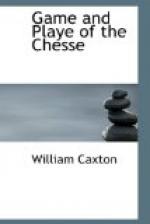[Illustration]
The seconde chapiter of the fourth book of the quene and how she yssueth oute of her place. [Transcriber’s note: The printer’s error in the original text, labeling the third chapter as “The seconde chapiter” is preserved here.]
Whan the Quene whiche is accompanyed vnto the kynge begynneth to meue from her propre place/ She goth in dowble manere/ that is to wete as an Alphyn whan she is black/ fhe may goo on the ryght syde & come in to the poynt to fore the notarye And on the lifte syde in the black poynt and come to fore the gardees of the cyte And hit is to wete that me sortiseth in her self the nature in .iii. maners first on the ryght syde to fore the alphyn/ Secondly on the lifte syde where the knyght is/ And thirdly indirectly vnto the black poynt to fore the phisicyen And the rayson why. Is for as moche as she hath in her self by grace/ the auctrorite that the rooks haue by c[=o]myscion/ For she may gyue & graute many thynges to her subgetts graciously And thus also ought she to haue parfyt wisedom/ as the alphyns haue whiche ben Iuges/ as hit sayd aboue in the chapitre of the Quene/ And she hath not the nature of knyghtes/ And hit is not fittynge ne couenable thynge for a woman to goo to bataylle for the fragilite and feblenes of her/ And therfore holdeth she not the waye in her draught as the knyghtes doon/ And whan she is meuyd ones oute of her place she may not goo but fro oon poynt to an other and yet cornerly whether hit be foreward or backward takynge or to be taken/ And here may be axid why the quene goth to the bataylle wyth the kynge/ certainly it is for the solace of hym/ and ostencion of loue/ And also the peple desire to haue sucession of the kynge And therfore the tartaris haue their wyues in to the felde with hem/ yet hit is not good that men haue theyr wyuys with hem/ but that they abyde in the cytees or within their owne termes/ For whan they ben oute of theyr cytees and limytes they ben not sure/ but holden suspecte/ they shold be shamfast and hold alle men suspect/ For dyna Iacob’s doughter as longe as she was in the hows of her brethern/ she kept her virginite/ But assone as she wente for to see the strange Regyons. Anone she was corrupt and defowled of the sone of sichem/ Seneca sayth that the women that haue euyll visages ben gladly not chaste/ but theyr corage desireth gladly the companye of men/ And Solynus saith that no bestes femellys desyre to be towched of theyr males whan they haue conceyuyd/ Exept woman whyche ought to be a best Raysonable/




